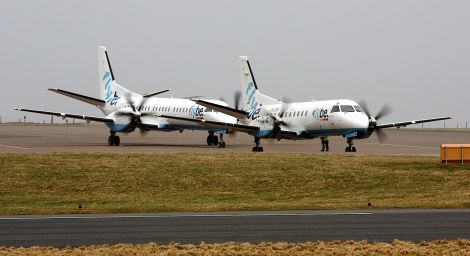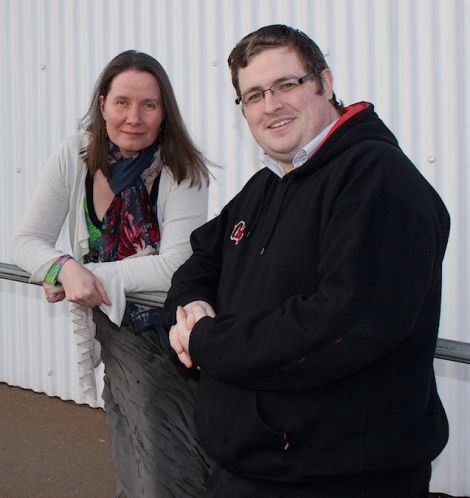News / Renewed calls for lower Loganair fares
FLYBE and Loganair need to introduce “more imaginative pricing” and provide more seats at lower fares on flights in and out of Shetland, according to isles MSP Tavish Scott.
A growing number of islanders are questioning why fares remain so high despite a huge tumble in oil prices, a boom in the number of passengers travelling through Sumburgh Airport and healthy profits for Loganair.
In November the airline, which has operated the Northern Isles franchise on behalf of Flybe since 2008, announced annual profits of £6 million on an £87.5 million turnover.
Former Tagon Stores co-owner Scott Preston told Shetland News that the “extortionate” cost of getting to and from Shetland was a factor in he and his wife’s decision to give up their shop in Voe and move back to the UK mainland to be closer to their relatives.
“We’ve had to give up our life, friends, business and home after three years of filling the already stuffed Loganair bank account, as many Shetland folk are forced to do whenever they need the lifeline service,” Preston said.
“It’s too expensive and it’s not flexible enough on short notice and, while that’s part of island living, it shouldn’t be so restrictive as to cause financial problems for families here who have relatives on the mainland.”
He pointed out that Loganair had made double the profit of some of Shetland’s largest companies in the past 12 months.
BBC Scotland broadcaster Jonathan Sutherland said he was incredulous after paying £760 for return flights from Glasgow for himself and his seven year old son to travel back to Shetland to attend his grandmother’s funeral – which had to be booked at very short notice.
“I couldn’t believe it,” he told Shetland News. “I expected it to be expensive – it always is – but this was a whole new level.
Become a member of Shetland News
“I understand there are economies of scale, but it does seem utterly unfair that prices should be so high. I’d booked our regular annual trip to Shetland a few months ago in advance and the price was about 50 per cent cheaper – and I still thought that was pricey. It’s at the stage now where we only travel to Shetland once a year due to the prohibitive cost.”
Earlier this year, Scott criticised Loganair for failing to reduce fares despite the steep fall in oil prices.
Since September the price of a barrel of oil has fallen from $110 to around $65. But, although engine fuel accounts for a large proportion of an airline’s spending, Loganair says it buys its fuel a year or two in advance.
Oil and gas activity has helped Sumburgh Airport become the fastest-growing airport in Scotland, with Loganair bringing in a trio of 50-seat Saab 2000 aircraft and adding new flights to its schedule in the past year or so.
Scott has been campaigning on the issue this year, and says Shetlanders simply “want Flybe to offer lower fares”.
“If people can plan well ahead and use ADS then cheaper seats are available,” he said. “But last minute journeys caused by such events as funerals are cripplingly expensive.
“Many expat islanders who live on the UK mainland tell me that they would come home more often if fares were lower. Visiting family and friends is part of Shetland tourism and boosts our economy. So we need to see more seats available at lower fares.”
He said the Scottish Government could increase the rate for the Air Discount Scheme (ADS) and “reinstate their wrong decision to remove business travel and young apprentices travelling south for courses from the scheme. Those bad decisions should be reversed”.
“But ADS doesn’t help people travelling to Shetland,” Scott added. “We need Flybe to be more imaginative about pricing.
“Oil workers for Sullom Voe and offshore crew changes fill up planes. But visitors need cheaper seats. That is what the airline must explore for the benefit of Shetland. Another passenger on a flight even paying half fare is better than an empty seat.”
The airline’s PR company rejected a request from Shetland News for an interview with a member of Loganair’s management team.
Instead it issued a statement and said chief operating officer Phil Preston would be happy to be interviewed when he next visits Shetland for an external transport forum meeting.
A spokesman said: “Loganair, in common with most airlines, manages the risk of fuel price changes by purchasing its fuel up to one to two years in advance. At a time of price fluctuation this can unfortunately mean that the airline does not see the benefit of lower prices for an extended time.
“An additional factor is that fuel prices are in US dollars. With the recent decline in sterling against the dollar this has had an impact on the final price in sterling.”
Addressing why prices are so much higher for flights booked at short notice, the spokesman said: “As with most other transport providers, ticket prices are tiered and the availability of fares varies by flight, by day, by season and is influenced by a number of fluctuating variables, especially on busy routes.
“Fares purchased in close proximity to the time of departure are generally more expensive.”
The spokesman said that routes were always reviewed to “ensure the most convenient services are being provided for passengers, which is why we’ve been able to add 20 per cent more seats into the winter 2015/16 schedule”.
He added: “Passengers are advised to contact customer services should they wish to discuss a specific fare.”
Become a member of Shetland News
Shetland News is asking its many readers to consider paying for membership to get additional features and services: -
- Remove non-local ads;
- Bookmark posts to read later;
- Exclusive curated weekly newsletter;
- Hide membership messages;
- Comments open for discussion.
If you appreciate what we do and feel strongly about impartial local journalism, then please become a member of Shetland News by either making a single payment, or setting up a monthly, quarterly or yearly subscription.






























































